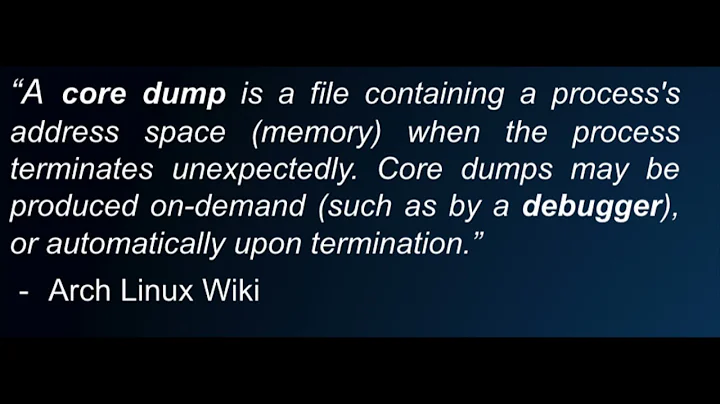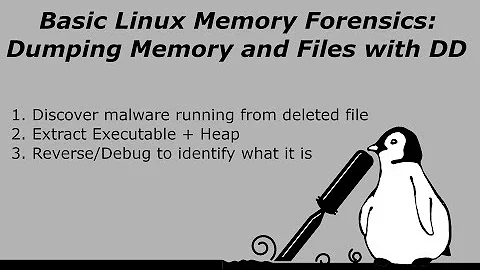Dump a linux process's memory to file
Solution 1
I'm not sure how you dump all the memory to a file without doing this repeatedly (if anyone knows an automated way to get gdb to do this please let me know), but the following works for any one batch of memory assuming you know the pid:
$ cat /proc/[pid]/maps
This will be in the format (example):
00400000-00421000 r-xp 00000000 08:01 592398 /usr/libexec/dovecot/pop3-login
00621000-00622000 rw-p 00021000 08:01 592398 /usr/libexec/dovecot/pop3-login
00622000-0066a000 rw-p 00622000 00:00 0 [heap]
3e73200000-3e7321c000 r-xp 00000000 08:01 229378 /lib64/ld-2.5.so
3e7341b000-3e7341c000 r--p 0001b000 08:01 229378 /lib64/ld-2.5.so
Pick one batch of memory (so for example 00621000-00622000) then use gdb as root to attach to the process and dump that memory:
$ gdb --pid [pid]
(gdb) dump memory /root/output 0x00621000 0x00622000
Then analyse /root/output with the strings command, less you want the PuTTY all over your screen.
Solution 2
I've made a script that accomplishes this task.
The idea commes from James Lawrie's answer and this post: http://www.linuxforums.org/forum/programming-scripting/52375-reading-memory-other-processes.html#post287195
#!/bin/bash
grep rw-p /proc/$1/maps \
| sed -n 's/^\([0-9a-f]*\)-\([0-9a-f]*\) .*$/\1 \2/p' \
| while read start stop; do \
gdb --batch --pid $1 -ex \
"dump memory $1-$start-$stop.dump 0x$start 0x$stop"; \
done
put this in a file (eg. "dump-all-memory-of-pid.sh") and make it executable
usage: ./dump-all-memory-of-pid.sh [pid]
The output is printed to files with the names: pid-startaddress-stopaddress.dump
Dependencies: gdb
Solution 3
try
gcore $pid
where $pid is the actual number of the pid; for more info see: info gcore
may take some time for the dump to happen, and some memory may not be readable, but is good enough... be aware also that it can create big files, I just created a 2GB file that way..
Solution 4
Pure bash solution:
procdump()
(
cat /proc/$1/maps | grep "rw-p" | awk '{print $1}' | ( IFS="-"
while read a b; do
dd if=/proc/$1/mem bs=$( getconf PAGESIZE ) iflag=skip_bytes,count_bytes \
skip=$(( 0x$a )) count=$(( 0x$b - 0x$a )) of="$1_mem_$a.bin"
done )
)
Usage: procdump PID
for a cleaner dump filter out *.so memory mapped shared libraries and empty memory ranges:
procdump()
(
cat /proc/$1/maps | grep -Fv ".so" | grep " 0 " | awk '{print $1}' | ( IFS="-"
while read a b; do
dd if=/proc/$1/mem bs=$( getconf PAGESIZE ) iflag=skip_bytes,count_bytes \
skip=$(( 0x$a )) count=$(( 0x$b - 0x$a )) of="$1_mem_$a.bin"
done )
)
Solution 5
man proc says :
/proc/[pid]/mem This file can be used to access the pages of a process's memory through open(2), read(2), and lseek(2).
Maybe it can help you
Related videos on Youtube
lenny
Updated on September 17, 2022Comments
-
 lenny over 1 year
lenny over 1 yearIs it possible to dump the current memory allocated for a process (by PID) to a file? Or read it somehow?
-
 Gilles 'SO- stop being evil' over 10 yearsYou can use my proof-of-concept script that reads
Gilles 'SO- stop being evil' over 10 yearsYou can use my proof-of-concept script that reads/proc/$pid/mem. -
Simon A. Eugster about 10 yearsYou might also want to read superuser.com/questions/236390/… and use gcore instead.
-
-
user2910702 about 11 yearsThat's not sufficient, reading another process needs a combination of /proc/<pid>/{mem,*maps}, ptrace, and some signal handling to avoid hanging the target process.
-
user2910702 about 11 yearsThis one is obsolete (removed at maintainer's request); I installed the old package anyway and it failed with "Input/output error; did you use GCC with another machine's header files?".
-
 Gilles 'SO- stop being evil' over 10 years@Tobu Indeed. I wrote a proof-of-concept script.
Gilles 'SO- stop being evil' over 10 years@Tobu Indeed. I wrote a proof-of-concept script. -
 Tobia almost 8 yearsAwesome! Just used it to discover which script a mysterious bash instance was running.
Tobia almost 8 yearsAwesome! Just used it to discover which script a mysterious bash instance was running. -
CMCDragonkai almost 8 yearsIs
gcoredumping a sparse file? -
 Programming4life about 7 yearsIs there a way of doing this in just bash/sh without gdb?
Programming4life about 7 yearsIs there a way of doing this in just bash/sh without gdb? -
 julian about 7 years@Programming4life gcore(1)
julian about 7 years@Programming4life gcore(1) -
mxmlnkn almost 5 yearsWhy are you only grepping for and dumpying ranges with
rw-ppermissions? -
mxmlnkn almost 5 yearsSo, from what I understand, the idea behind the cleaner dump is that only in-memory files have a size attached to the memory region in contrast to actual application memory, which has size 0 (as the size actually used size is unknown by the OS).
-
mxmlnkn almost 5 yearsOne issue I have with this script is that the blocksize of 1 leads to a bandwidth of unacceptably slow ~30kB/s compared to using a blocksize equal to the page size (4096 for me) for which I get ~100MB/s! See here.
getconf PAGESIZEis used to get the page size and then the addresses and counts are divided by it. -
A. Nilsson almost 5 years@mxmlnkn That's data (
rw-p), the other ranges are for code (r-xp). If you want a dump of both, then go ahead and exchangegrepfor e.g.cat. -
Zibri about 4 years@mxmlnkn that was lazy of me, feel free to correct my answer.
-
mxmlnkn about 4 yearsOk, will do. Note also that the count calculation is wrong because it is done with bd-ad but bd and ad are calculated only thereafter in the first bash snippet.
-
Déjà vu almost 4 years@CMCDragonkai use
gcore -a PID -
 Admin almost 2 yearsSo reading /proc/<PID>/mem directly isn't an option? I get a read error if I try and open the 'file' in an editor.
Admin almost 2 yearsSo reading /proc/<PID>/mem directly isn't an option? I get a read error if I try and open the 'file' in an editor.




